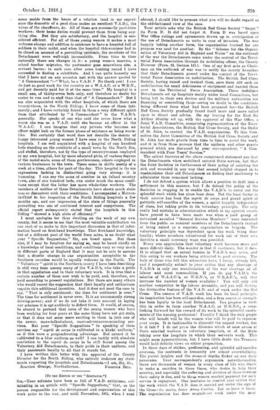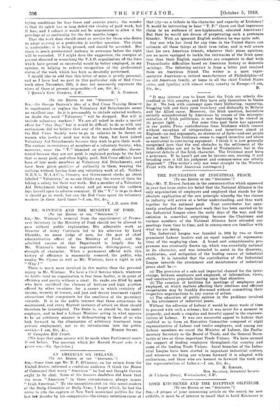[TO THE EDITOR OF THE " SPEOTATOZ."]
SIR.—Your columns have been so full of V.A.D. criticisms, cul- minating in an article with "Specific Suggestions," that, as the person responsible for the development and organization of this work prior to the- war, and until November, 1915, when I went
abroad, I should like to present what you will no doubt regard as the- old-fashioned view of the case.
Your article asks why the British Red Cross Society " forgot" it Form D. It did not forget it. Form D was based upon War Office rulings and agreements drawn up in anticipation of the use of Detachments as units in ease of invasion. The war happily taking another form, the organization -trained for one purpose was used for another. By the " Scheme for the Organi- zation of Voluntary Aid in Itigiand and Wales " on the outbreak of the war the Detachments came under the oontrol of the Terri- torial Force Association through its mobilizing officer, the County Director (Para. 32, Section III.). One of my first acts as Chair- man on the outbreak of war was to notify the county branches that their Detachments passed under the control of the Terri- torial Force Association on mobilisation. The British Red Cross Society, having raised and trained them, gave them £10 each on mobilization for small deficiencies of equipment and handed them over to the Territorial Force Association. These mobilizea Detachments Bet up hospitals mainly under local Committees, but being left to their own devices and the military authorities not financing or controlling them—owing no doubt to the conditions being different from what had been prepared for—the British Red Cross Society gradually found itself more and more called upon to direct and advise. On my leaving for the East Sir Arthur Stanley set up, with the approval of the War Office, a Joint V.A.D. Committee, comprising representatives of the Terri- torial Associations, the British Red Cross Society, and the Order of St. John, to control the V.A.D. organization. To this Com- mittee the Joint Committee of the British Red Cross Society and St. John has made grants from time to time to assist the work, and it is from these moneys that the uniform and other grants proceed which are discussed by your correspondent, "A Com- mandant with Four Years' Service."
The salient features of the above compressed statement are that the Detachments when mobilized entered State service, but that the Joint Societies in furtherance of their policy of assisting the sick and wounded in any way that seemed helpful stepped in to readminister their old Detachments on finding that machinery to administer them remained lacking.
I do not defend a system which allows a position to drift into a settlement in this manner, but I do defend the policy of the Societies in stepping in to enable the V.A.D.'s to carry out the splendid work which has since been done. Not the least factor in their success has been the esprit de corps and grand spirit of patriotic self-sacrifice of the women, a spirit happily independent of class, but taking pride in its voluntary principle. The only really bad mistake in administration which in my opinion events have proved to have been made was when a paid group of untrained so-called "General Service Members" were reoruited from the public as nominal members of the Detachments instead of being raised as a separate organization or brigade. The voluntary principle was dependent upon the work being done locally; where members volunteered for work out of their own districts a small necessary wage was provided.
Every one appreciates that voluntary work becomes more and more difficult daily. The wonder is that it continues, but it does. It is alleged that an actual famine in V.A.D.'s may arise, and this owing to our workers being attracted to paid services. The bulk of those who felt this attraction have, I fancy, already left, and I respectfully submit to your critics that any shortage of V.A.D.'s is only one manifestation of the war shortage of all labour and most commodities. If you do pay V.A.D.'s the salaries of W.A.A.C.'s, or W.R.N.'s, or W.R.A.F.'s, will that increase the number of women available ? You will only add another competitor to the labour scramble, and you will destroy the distinctive feature of the V.A.D. and of work under the Red Cross. The essence of V.A.D. work has been its local principle, its inspiration has been self-sacrifice, and a firm source of strength has been loyalty to the local Detachment. You propose to undo this in order to form another W.A.A.C. or W.R.N.S., a corps looking forward for the reward of its work to the eplendid emolu- ments of the nursing profession! Frankly I think the only people who will benefit will be the women who will be paid to organize your corps. It is fashionable to discredit the unpaid worker, but is it fair ? I do not press the dilemma which at once arises of State salaried workers in voluntary hospitals, or of the State taking over the hospitals in which their servants work. This might seem hypercriticism, but I have little doubt the Treasury would hold definite views on either proposition.
In these days of strikes, profiteering, and splendid self-sacrifice overseas, the contrasts in humanity are almost overwhelming. The purest heights and the meanest depths flicker on our daily
panorama. Your correspondent's arguments notwithstanding, there are thousands of women in every class of life who desire to make a sacrifice in these times, who desire to help their country, and especially the suffering and stricken of those to whom their safety is due, and to these women market payment. for such service is repugnant. One hesitates to remind your critics that the work which the V.A.D. does is carried out under the sign of the Cross—its motto, Inter Anna Caritas. Let us leave it there. The organization has done magnificent work under the most -- trying conditions for four tense and anxious years; the wonder is that its spirit has so long defied the rivalry of paid work, but it has;.and I submit it would not be ungenerous to allow it the privilege of so continuing for the few months longer.
That the work done should count as service for those who desire to adopt nursing as a profession is another question. The claim is undeniable; it is being pressed, and should be accorded. But there is much professional jealousy to overcome before the right will be conceded. If I might dare the suggestion, the energies at present directed to wrenching the V.A.D. organization off the lines which have proved so successful would be better employed, in my opinion, in helping to enforce recognition of the professional status of the work which has been so devotedly performed.
I should like to add that this letter of mine is purely personal, and as I have had no part in this particular side of Red Cross work since November, 1915, it does not necessarily represent the views of those at present responsible.—I am, Sir, &c.,



































 Previous page
Previous page